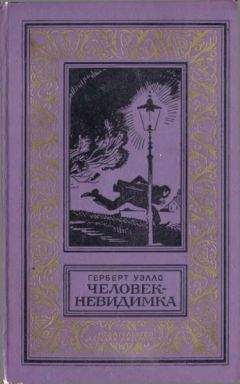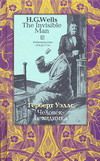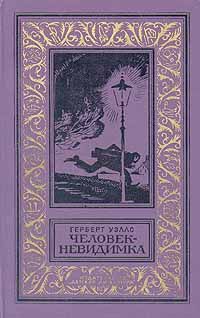H. Wells - Английский язык с Г. Уэллсом "Человек-невидимка"
intolerable [In`tOl(q)rqbl], scheme [skJm], species [`spJSJz]
The Invisible Man seems to have rushed out of Kemp’s house in a state of blind fury. A little child playing near Kemp’s gateway was violently caught up and thrown aside, so that its ankle was broken, and thereafter for some hours the Invisible Man passed out of human perceptions. No one knows where he went nor what he did. But one can imagine him hurrying through the hot June forenoon, up the hill and on to the open downland behind Port Burdock, raging and despairing at his intolerable fate, and sheltering at last, heated and weary, amid the thickets of Hintondean, to piece together again his shattered schemes against his species. That seems the most probable refuge for him, for there it was he re-asserted himself in a grimly tragical manner about two in the afternoon.
One wonders what his state of mind may have been during that time (можно только догадываться, в каком настроении он находился в это время; state of mind — душевноесостояние, умонастроение; направлениемыслей), and what plans he devised (и что замышлял; to devise — разрабатывать, продумывать/планы, идеи/; задумывать). No doubt he was almost ecstatically exasperated by Kemp’s treachery (несомненно, он был почти исступленно = чрезвычайноразгневан предательством Кемпа), and though we may be able to understand the motives that led to that deceit (и, хотя можно понять мотивы, приведшие к этому обману), we may still imagine and even sympathise a little with the fury (все же можно представить себе и даже отчасти понять ярость; to sympathise — сочувствовать; разделятьчувства; симпатизировать) the attempted surprise must have occasioned (которую, должно быть, вызвала эта неудавшаяся неожиданность= измена; to occasion — служитьповодом, вызывать; to attempt — попытаться). Perhaps something of the stunned astonishment of his Oxford Street experiences may have returned to him (возможно, к нему вернулось чувство, похожее на ошеломленное изумление, испытанное им на Оксфорд-стрит), for he had evidently counted on Kemp’s co-operation in his brutal dream of a terrorised world (ведь он, несомненно, рассчитывал на помощь Кемпа в осуществлении своей жестокой мечты о мире, подвергнутом террору; cooperation — сотрудничество, совместныедействия). At any rate he vanished from human ken about midday (как бы то ни было, он исчез из виду около полудня; ken — кругозор), and no living witness can tell what he did until about half-past two (и никто: «ни один живущий очевидец/свидетель» не может сказать, что он делал до половины третьего). It was a fortunate thing, perhaps, for humanity (возможно, для человечества это к лучшему), but for him it was a fatal inaction (но для него это бездействие оказалось роковым).
ecstatically [Iks`stxtIklI], motive [`mqutIv], sympathise [`sImpqTaIz], counted [`kauntId]
One wonders what his state of mind may have been during that time, and what plans he devised. No doubt he was almost ecstatically exasperated by Kemp’s treachery, and though we may be able to understand the motives that led to that deceit, we may still imagine and even sympathise a little with the fury the attempted surprise must have occasioned. Perhaps something of the stunned astonishment of his Oxford Street experiences may have returned to him, for he had evidently counted on Kemp’s co-operation in his brutal dream of a terrorised world. At any rate he vanished from human ken about midday, and no living witness can tell what he did until about half-past two. It was a fortunate thing, perhaps, for humanity, but for him it was a fatal inaction.
During that time a growing multitude of men scattered over the countryside were busy (за это время растущее множество людей, рассеянных по всей округе, принялось за работу). In the morning he had still been simply a legend, a terror (утром Невидимка был еще просто сказкой, пугалом; legend — легенда; сказание, предание); in the afternoon, by virtue chiefly of Kemp’s drily worded proclamation (днем, в основном благодаря сухому воззванию Кемпа; to word — выражатьсловами, формулировать; proclamation — декларация; провозглашение; воззвание), he was presented as a tangible antagonist (он стал восприниматься как материальный противник; to present — представлять, являтьсобой), to be wounded, captured, or overcome (которого надо ранить, схватить или победить), and the countryside began organising itself with inconceivable rapidity (и все население стало готовиться /к борьбе/ с немыслимой быстротой; to organize — организовывать, планировать; устраивать; сплачивать/людей/). By two o’clock even he might still have removed himself out of the district by getting aboard a train (даже к двум часам он все еще мог покинуть округу, сев на поезд; to remove oneself — удалиться), but after two that became impossible (но после двух это стало невозможным). Every passenger train along the lines on a great parallelogram between Southampton, Manchester, Brighton and Horsham (каждый пассажирский поезд по всем железнодорожным линиям на огромном параллелограмме = обширномпространстве между Саутгемптоном, Манчестером, Брайтоном и Хоршемом), travelled with locked doors (шел с запертыми дверями), and the goods traffic was almost entirely suspended (а товарное движение почти полностью прекратилось; to suspend — подвешивать; приостанавливать, временнопрекращать). And in a great circle of twenty miles round Port Burdock (а в большом круге /радиусом/ в двадцать миль вокруг Порт-Бердока), men armed with guns and bludgeons were presently setting out in groups of three and four, with dogs (вскоре появились люди, вооруженные ружьями и дубинками, /двигавшиеся/ группами по три-четыре человека, с собаками; gun — огнестрельное оружие; ружье; to set out — выставлять; отправляться; выступать/противврага/), to beat the roads and fields (рыскавшие по дорогам и полям).
virtue [`vq:tjH, `vq:CH], antagonist [xn`txgqnIst], wounded [`wHndId]
During that time a growing multitude of men scattered over the countryside were busy. In the morning he had still been simply a legend, a terror; in the afternoon, by virtue chiefly of Kemp’s drily worded proclamation, he was presented as a tangible antagonist, to be wounded, captured, or overcome, and the countryside began organising itself with inconceivable rapidity. By two o’clock even he might still have removed himself out of the district by getting aboard a train, but after two that became impossible. Every passenger train along the lines on a great parallelogram between Southampton, Manchester, Brighton and Horsham, travelled with locked doors, and the goods traffic was almost entirely suspended. And in a great circle of twenty miles round Port Burdock, men armed with guns and bludgeons were presently setting out in groups of three and four, with dogs, to beat the roads and fields.
Mounted policemen rode along the country lanes (конные полицейские объезжали все дороги; to mount — подниматься, взбираться; садиться/налошадь, велосипед, вмашину/; to ride; lane — узкаядорога, тропинка/обычномеждуживымиизгородями/), stopping at every cottage and warning the people to lock up their houses (останавливаясь у каждого дома и предупреждая жителей, чтобы они запирались), and keep indoors unless they were armed (и не выходили на улицу, если не вооружены = без оружия), and all the elementary schools had broken up by three o’clock (и все школы закрылись к трем часам; elementary school — общеобразовательнаягосударственнаяшкола/длядетейот5 до14 лет; существоваладо1944 года/; to break up — закрыватьсянаканикулы, распускатьучениковнаканикулы), and the children, scared and keeping together in groups, were hurrying home (и напуганные дети, держась группами, спешили домой). Kemp’s proclamation — signed indeed by Adye (воззвание Кемпа, подписанное Эдаем) — was posted over almost the whole district by four or five o’clock in the afternoon (было расклеено почти по всей округе к четырем-пяти часам). It gave briefly but clearly all the conditions of the struggle (в нем кратко, но четко указывались все условия = меры борьбы), the necessity of keeping the Invisible Man from food and sleep (/необходимость/ не давать Невидимке есть и спать: «удерживать от еды и сна»; necessity — необходимость; требование; to keep from — непозволять, удерживать/ся/), the necessity for incessant watchfulness (постоянная бдительность; incessant — беспрестанный, непрерывный, постоянный) and for a prompt attention to any evidence of his movements (и быстрое внимание к любому признаку его перемещений).
And so swift and decided was the action of the authorities (и столь быстрыми и решительными были действия властей), so prompt and universal was the belief in this strange being (столь всеобщей была вера в это странное существо; prompt — проворный, исполнительный, немедленный), that before nightfall an area of several hundred square miles was in a stringent state of siege (что до наступления ночи площадь в несколько сотен квадратных миль находилась в жестком осадном положении; stringent — вяжущий/овкусе/; строгий; обязательный, точный). And before nightfall, too, a thrill of horror went through the whole watching nervous countryside (и также до наступления ночи трепет ужаса пронесся по всей настороженной, напуганной округе). Going from whispering mouth to mouth (передаваясь шепотом из уст в уста: «от шепчущего рта ко рту»), swift and certain over the length and breadth of the country (стремительно и верно, из края в край; /through/ the length and breadth of — вдольипоперек, изкраявкрай, повсейстране; length — длина; breadth — ширина), passed the story of the murder of Mr. Wicksteed (распространялся слух об убийстве мистера Уикстида).



